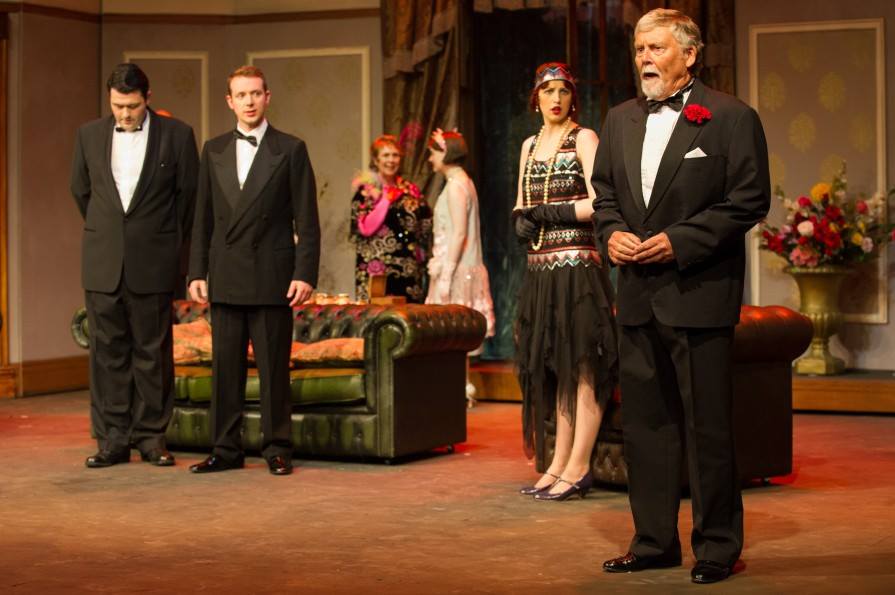The Garrick's season kicks off to a comedic start with the classic farce, Charley's Aunt. Written by Brandon Thomas, a contemporary of Oscar Wilde, Thomas was an actor and playwright of some distinction, and wrote many 'comedies of manners' which proved exceedingly popular at the time. Sadly, none have survived save their titles, excepting Charley's Aunt; which tells the story of three young men studying at university, all desperately in love and somehow manage to convince one of the men to dress up as another's millionairess widowed aunt from Brazil (where the nuts come from!) in order that they might use her as a chaperone in order to get closer to the girls and tell them how they feel. And of course, as everyone knows, in farce, nothing ever goes according to plan but of course, again, according to the rules of farce, everything works out fine in the end!
Of course, the plot and scenario are very dated and laboured; and despite some excellent one-liners, the script really doesn't sparkle, and cross-dressing in our modern society is neither new nor shocking; and so it was a really quite surprising choice for Altrincham's Garrick Playhouse with which to commence their 2016 / 2017 Season.
Even more surprising was director's Alan Clements choice to set the play in the year 1920. The play was first performed in 1892 and that year transferred to the West End for a then record-breaking run of 1466 performances. Numerous revivals have been mounted over the years, and, just as a little historical back-note, when Thomas's daughter Amy Brandon-Thomas took over the role of Kitty, she insisted on setting each new version in the present despite the negativity of critics saying it would be better played in the period in which it was written. That argument continues to this day, and of course, setting the play in our present would not work at all, but I am uncertain as to why 1920 was chosen. It is only 2 years since the end of the First World War and Britain was still recoiling from that, and our three young male protagonists would undoubtedly have been called up and seen active service, and so, for me at least, this choice didn't work. 
The set too was also one of the least convincing I have seen at the Garrick. In the first act the greenery being flown in for the second was clearly visible, and the grey stones on the outside to the apartment's main door looked very much like breezeblock. Even when they were reverted in the second act into the garden scene, I couldn't get the breezeblock image out of my mind. In the first scene it is morning and yet it was dark and black looking through the window. The scene change into the third scene however was very swift and cleverly thought through. I liked the idea of the auditorium chase sequence, and it was not overlong, bringing us back on to stage for the start of the third scene. I would have liked to have had less light on stage during this change though. It was rather distracting seeing stage hands in modern clothes and wearing headsets in the 1920s!
Alan Clements direction was, in the main, quite solid and well thought through; despite many of the more physical and comedic moves seeming somewhat laboured. Maybe since this was opening night, they will be more at ease with them and allow them to become more natural now they know they work. It was the entrances and exits in the second act which simply didn't make any sense for me. Especially those which involved entering and exiting the apartment.
It was a very well chosen cast and all brought a great deal to the production, with some lovely little characters emerging. It is an incredibly difficult task though for modern actors, to ask them to recreate the moods, body-languages, voices and mannerisms of 1920 in a play which was written with the moods, body-languages, voices and mannerisms of 3 decades earlier.
Special mention should be given though to Callum Anderson as Charley Wykeham and Liz Fraser as Ela Delahay who did indeed manage to strike this delicate balance extremely well. The two older gentlemen in the play, Colonel Sir Francis Chesney (David Reynolds) and Stephen Spettigue (Richard Sails), brought with them a sense of decorum and chivalry quintessential to that era, which, without this, the whole play would have fallen flat completely. But of course the whole play either falls or floats on the performance of Lord Fancourt Babberley who spends majority of the play in drag as Charley's aunt. In this production this pivotal role was played quite superbly by Paul Anthony. It didn't just float, it sailed magnificently! Anthony pitched the role just right, playing the aunt with a certain ungainly manliness but never resorting to panto dame roughness. The highlight for me which saw both the best acting and captured the era's manners and decorum superbly was the vignette in the garden scene between Sir Francis and Babberley as Charley's aunt.
If the actors relax a little more into their roles, and the pace is picked up [remember this is Musical Hall style farce and not Coward-esque gentility] then Charley's Aunt will become a great opening to this season and a production to be remembered with joy and pride.
Reviewer: Mark Dee
Reviewed: 5th September 2016
Photo: http://www.pixbyvish.co.uk/

